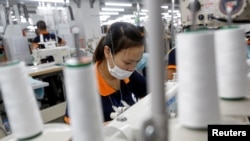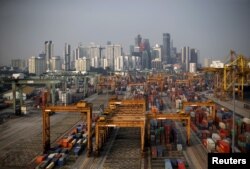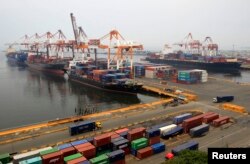Asian economies, already facing weak growth in exports, are bracing for more challenges amid growing protectionism, with wider ramifications for key economies such as Vietnam and Malaysia, economists say.
The recently released United Nations report, the World Economic Situation and Prospects 2017, says East Asian growth has been moderately positive, with China’s economy stabilizing at about 6.5 percent forecast growth in 2017. It says export growth in Asia remains weak, in line with global trends, but that domestic demand, spurred by private and public investment, “remains the key driver to regional growth.”
Multilateral trade and commerce, and particularly access to the U.S. market, have long been driving forces for Asia’s economies.
But economists say a climate of protectionism raises concerns over the outlook, even as export trade has been a driving force lifting millions out of poverty across the region.
US withdrawal from TPP
The latest warning came this week following President Donald Trump’s decision to withdraw the U.S. from the 12 member Trans Pacific Partnership (TPP). UN senior economist Jose Antonio Pedrosa Garcia says the key policy concern for Asia is the challenge to multilateralism — a cornerstone of economic growth in past decades.
“We are seeing a rise of protectionism, we’re seeing that initiatives that had absorbed a lot of work — such as the TPP or the much more recently the Paris Accords [on Climate Change] are in danger,” Garcia told a news conference.
“All these things raise fundamental questions about multilateralism. Is it in danger? Do we need to have better policy coordination?” he said.
Amornthep Chawla, head of research office at CIMB Thai Bank, said a U.S. administration policy to promote domestic U.S. growth, may come at the expense of emerging Asia — especially exports in Asia.
Slowdown expected
“Countries like Malaysia and Singapore, even to some extent the Philippines, they export something — especially Malaysia and Singapore, they export something that could compete with things produced in the U.S. So I would say that problems or some slowdown in exports will come from Malaysia and Singapore,” Chawla said.
In a commentary appearing in an in-house publication emailed to subscribers, economists with the London-based group Capital Economics said the demise of TPP “represented a major blow to some countries in emerging Asia, most notably Vietnam.” The economists said that as Vietnam and Malaysia “were set to be the biggest beneficiaries of the TPP, this represents a blow.”
The key gains lay in non-tariff areas of the agreement, including the elimination of non-tariff barriers such as rules on government procurement, investment restrictions and hidden subsidies.
“Any moves towards protectionism would deal a blow to the region’s most trade-dependent economies such as Singapore, Taiwan and Vietnam,” Capital Economics said in their commentary.
Pavida Pananond, a professor of international business studies at Thammasat University, expressed similar concerns about protectionism in global trade and business.
“The rising protectionism that could possible happen if [Trump] indeed put in tariffs on imports from other countries, so that would certainly will be one direct impact on international trade,” Pavida told VOA.
“With [higher tariffs] the retaliation of other countries that could bring up the wave of anti-globalization protectionist and nationalist agenda. That is quite dangerous — it’s dangerous for the world but it is more dangerous for countries that have been dependent on exports such as those in Asia,” she said.
She said any shift by the United States in long standing policies towards Taiwan, which China considers a breakaway province, would lead to rising regional tensions.
“It could make the region more regionally oriented because now Asia would probably think that opportunities to do business within the region have increased because of the need to look for alternative export markets,” she said.
Labor impact
Outside of trade, a U.S. policy to promote American employment would impact the Philippines, which has thrived on business process outsourcing (BPO), a sector that has accounted for about 10 percent of national output (GDP).
“It has been estimated that around three quarters of total revenue from the sector comes from U.S. companies,” Capital Economics said.
The sector, including in India, would be hard hit if American companies were called on to bring this work back to the United States.
Restrictions on immigration may also affect the Philippines. There are currently some four million Filipinos living in the United States who return remittances equivalent to around 3.0 percent of the Philippine national output. Even halting the arrival of new Filipinos to the U.S. could cause remittance growth to slow, damaging growth.
“There remains great uncertainty over how U.S.-Asia security and political relations will evolve under [President] Trump,” the economists said.
The U.S. security presence in the region has been a source of peace and prosperity in Asia. “A radical change in foreign policy could pose a significant risk to the region’s economies,” the economists added.








